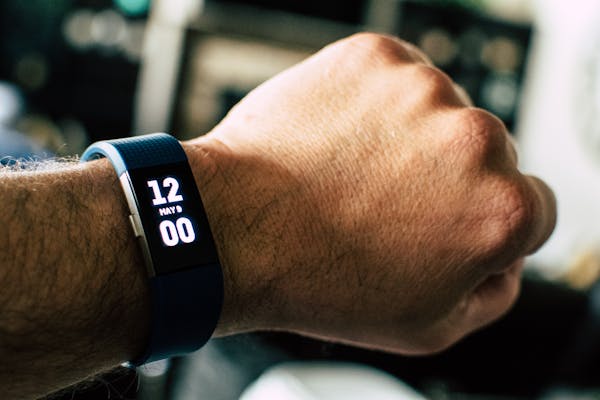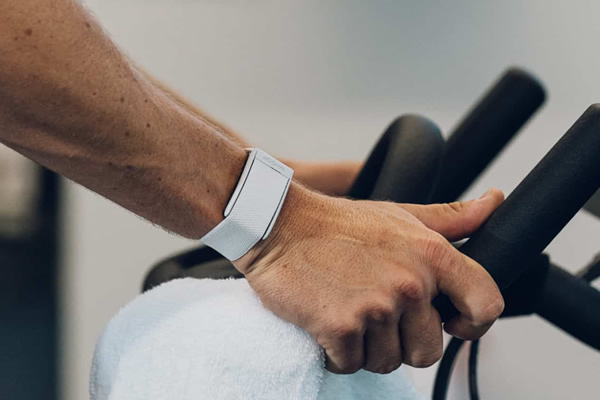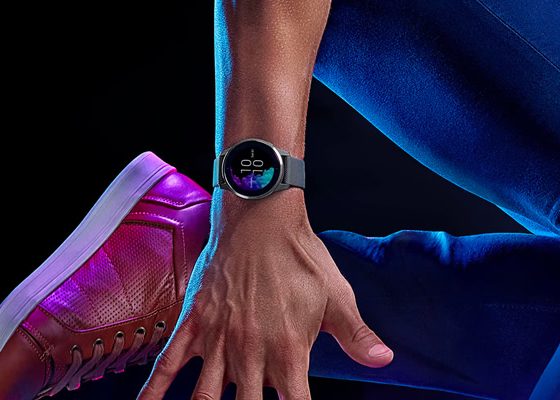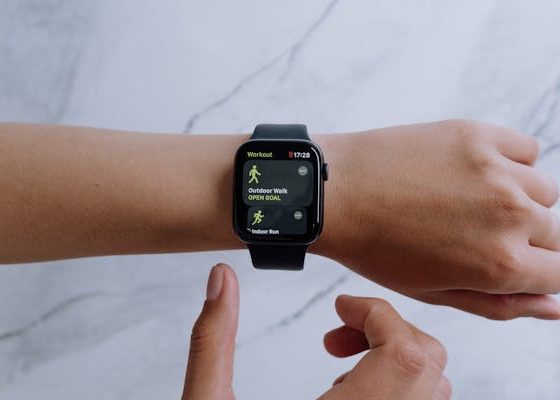Introduction
The Rise of Fitness Trackers
In a society that values an active lifestyle, the popularity of fitness trackers has soared. These sleek, wearable devices serve as constant companions, helping individuals keep a vigilant eye on their well-being. From counting steps to monitoring heart rate, they are your fitness guru on your wrist.
Importance of Monitoring Health
It’s no secret that maintaining good health is crucial. Fitness trackers have carved a niche in the health and wellness landscape by offering real-time data that empowers individuals to take charge of their physical well-being.
Purpose of the Article
This article serves as a comprehensive guide, offering an in-depth analysis of fitness trackers. We will examine the benefits of using these devices, delve into the various brands and models, scrutinize essential features, and explore the design and comfort aspects.
The Benefits of Fitness Trackers

Tracking Daily Activity
Tracking Daily Activity, a core component of the Benefits of Fitness Tracker, encompasses monitoring various metrics such as steps taken, calories burned, and sleep patterns, providing users with valuable insights into their daily habits. By consistently tracking activity levels, individuals can better understand their overall health and make informed decisions to improve their fitness routines. Additionally, having access to real-time data encourages accountability and motivation, fostering a proactive approach toward achieving wellness goals.
Monitoring Heart Rate
Monitoring heart rate is a crucial aspect of fitness tracking, allowing individuals to optimize their workouts and overall health. With the help of advanced sensors, fitness trackers accurately monitor heart rate in real-time, providing users with valuable insights into their cardiovascular performance during various activities. This feature enables users to maintain their target heart rate zones for efficient calorie burn, track improvements in cardiovascular endurance over time, and identify potential health issues such as irregular heartbeats. Overall, the inclusion of heart rate monitoring enhances the benefits of fitness trackers by offering personalized data-driven feedback for improved fitness and well-being.
Sleep Tracking
Sleep tracking, a key feature within the array of benefits of fitness trackers, enables users to monitor their sleep patterns, duration, and quality. By tracking sleep, individuals gain insights into their nightly rest, allowing them to make informed decisions to optimize their sleep hygiene and overall well-being. This feature often includes details such as sleep stages, interruptions, and recommendations for improvement, fostering healthier sleep habits and enhancing overall fitness goals.
Guiding Weight Management
One of the key benefits of fitness trackers is their ability to provide guiding weight management support. These devices offer users real-time data on their physical activity levels, calorie expenditure, and even dietary habits, empowering them to make informed decisions about their health and fitness goals. By tracking progress over time and setting achievable targets, individuals can effectively manage their weight, leading to improved overall wellness and lifestyle habits.
Motivating Physical Activity
Benefits of Fitness Tracker include motivating physical activity by providing users with real-time feedback on their daily exercise levels, step counts, and other metrics. These devices serve as constant reminders to stay active throughout the day, encouraging users to meet their daily activity goals and adopt a more active lifestyle. By tracking progress and setting achievable targets, individuals are motivated to engage in regular physical activity, leading to improved health and overall well-being.
Fitness Tracker Brands and Models

Leading Brands in the Market
Several brands have taken the fitness tracker world by storm. Fitbit, Garmin, Apple, and Samsung are some of the giants, each with a unique offering.
Popular Models and Their Features
Within each brand, you’ll find a range of models, each catering to specific needs. The Fitbit Charge, Garmin Forerunner, Apple Watch, and Samsung Galaxy Fit are just a few examples.
Price Range
Fitness trackers come in a wide price range, making them accessible to a broad audience. You can find basic models for under $50, while high-end options can cost several hundred dollars.
Features to Consider
Display and User Interface
The display is your window into the world of fitness tracking. Consider factors such as screen size, readability in various lighting conditions, and touch or button-based interfaces.
Battery Life
Long-lasting battery life is a boon, ensuring your tracker doesn’t run out of juice in the middle of a workout. Some last a week, while others can endure for months.
Water Resistance
Whether you’re swimming or caught in the rain, water resistance is a vital feature. Look for trackers with an IP67 or higher rating to ensure durability.
Compatibility with Devices
Check if the tracker syncs seamlessly with your smartphone or tablet. Compatibility is key for a hassle-free experience.
Third-Party App Integration
Many fitness trackers integrate with popular health and fitness apps, allowing you to consolidate all your health data in one place.
Design and Comfort
Aesthetics
The aesthetics of your fitness tracker matter. It’s not just a tool; it’s a fashion statement. Choose a design that suits your style.
Band Material
The band material plays a significant role in comfort. Options range from silicone to leather, each offering a different feel on your wrist.
Display Size and Type
Consider how much information you want to see at a glance. A larger display might be preferable if you want to read messages and notifications on your wrist.
Weight and Form Factor
The weight and form factor of your tracker impact wearability. Some are slim and discreet, while others are bulkier with more features.
Activity and Exercise Tracking
Activity and Exercise Tracking, one of the Benefits of Fitness Tracker, refers to the capability of monitoring and recording various physical activities and workouts throughout the day. This feature allows users to keep tabs on their progress, set goals, and adjust their fitness routines accordingly.
Step Counting
Step counting is the foundational feature of fitness trackers. It helps you set activity goals and track your daily movements.
Distance Measurement
Beyond steps, many trackers offer distance measurement, ideal for runners and walkers.
Calorie Tracking
Knowing how many calories you’ve burned is essential for weight management. Your tracker can calculate this based on your activity and heart rate.
GPS Functionality
For outdoor enthusiasts, built-in GPS can track your routes and provide accurate data on your workouts.
Sports Modes
Different trackers offer various sports modes, such as running, cycling, swimming, and more. These modes optimize tracking for specific activities.
Heart Rate Monitoring
Continuous vs. On-Demand Monitoring
Some trackers monitor your heart rate continuously, while others do so on-demand. Consider which approach suits your needs.
Accuracy and Precision
The accuracy and precision of heart rate monitoring can vary. Look for devices with advanced sensors for more reliable data.
Resting Heart Rate Tracking
Monitoring your resting heart rate can offer insights into your overall cardiovascular health and fitness levels.
Heart Rate Zones
Many trackers divide heart rate data into zones, helping you understand the intensity of your workouts and optimize training.
Sleep Tracking
Sleep Stages
Sleep trackers can differentiate between different sleep stages, including deep, light, and REM sleep.
Sleep Duration
Tracking how long you sleep is crucial for maintaining a consistent sleep schedule.
Sleep Quality Assessment
In addition to duration, some trackers assess sleep quality, offering tips to improve your sleep habits.
Smart Alarms
Waking up at the right moment in your sleep cycle can help you feel more refreshed. Smart alarms do just that.
Nutrition and Hydration Tracking
Calorie Intake Logging
Track your calorie intake by logging your meals and snacks, helping you manage your diet more effectively.
Hydration Monitoring
Staying adequately hydrated is crucial for your health. Some trackers remind you to drink water throughout the day.
Mealtime Reminders
Set mealtime reminders to maintain a regular eating schedule, which can be beneficial for weight management.
Food Recognition
Advanced trackers can even recognize the food you’re eating based on images or descriptions, providing a more accurate calorie count.
Stress and Relaxation Features
Stress Tracking
Stress tracking provides insights into your stress levels and can prompt you to take a break and relax.
Guided Breathing Exercises
Many trackers offer guided breathing exercises to help you calm down and reduce stress.
Relaxation Prompts
Get timely reminders to relax and take a moment for yourself, promoting mental well-being.
Health Metrics
Blood Pressure Monitoring
Some high-end trackers offer blood pressure monitoring, a valuable feature for individuals with hypertension.
Oxygen Saturation (SpO2) Tracking
Measuring your blood oxygen levels can provide insights into your respiratory health.
Body Temperature Monitoring
Body temperature tracking can be useful for detecting fever or monitoring changes in your basal body temperature.
Notifications and Smart Features
Notifications and smart features are integral benefits of fitness trackers, enhancing their utility beyond simple activity tracking. These features enable users to stay connected and informed throughout their daily routines, receiving alerts for calls, messages, and app notifications directly on their wrists.
Call and Message Alerts
Receive call and message notifications on your tracker, keeping you connected on the go.
App Notifications
Beyond calls and messages, some trackers offer notifications from your favorite apps, ensuring you stay informed.
Music Control
Control your music playback right from your wrist, eliminating the need to pull out your phone during workouts.
Payment Options
Certain trackers are equipped with payment capabilities, allowing you to make purchases with a simple wrist gesture.
Battery Life and Charging
Battery Duration
Long-lasting battery life is essential, especially if you’re tracking activities over an extended period. Look for trackers that offer multiple days or even weeks of use.
Charging Methods
Different trackers come with various charging methods, including magnetic chargers, USB ports, or wireless charging.
Charging Time
Consider how long it takes to recharge your tracker fully. Shorter charging times mean less downtime.
Data Accuracy and Reliability
Data Accuracy and Reliability are paramount among the Benefits of Fitness Trackers, ensuring that the information collected, such as heart rate, steps taken, and calories burned, is precise and trustworthy. Users rely on these devices to provide accurate measurements, enabling them to make informed decisions about their health and fitness goals.
Sensor Technology
The quality of sensors can significantly impact data accuracy. Premium trackers often employ advanced sensor technology.
Data Syncing
The reliability of data syncing between your tracker and your smartphone or computer is crucial to maintaining up-to-date information.
Data Consistency
Inaccurate or inconsistent data can lead to frustration. Look for trackers with a reputation for data consistency.
Companion Apps and Software
Companion apps and software are integral components of the Benefits of Fitness Tracker, enhancing user experience and providing comprehensive insights into health and fitness metrics. These applications complement wearable devices by offering detailed analysis, goal tracking, and personalized recommendations based on collected data.
User-Friendly Interfaces
Companion apps are the gateway to your fitness data. Opt for apps with intuitive interfaces that provide clear insights.
Data Analysis and Insights
Companion apps should offer in-depth data analysis and personalized insights to help you make informed decisions.
Community and Social Features
Joining a fitness community or sharing your achievements with friends can be motivating. Look for trackers with built-in social features.
Privacy and Security
Privacy and security are paramount among the benefits of fitness trackers, ensuring users’ sensitive health data remains safeguarded. These devices offer individuals the ability to monitor their physical activity, heart rate, and even sleep patterns with precision and convenience.
Data Privacy Policies
Ensure your data is protected by reviewing the privacy policies of both the tracker and the companion app.
Data Encryption
Look for trackers that encrypt your data during transmission to keep it secure.
User Control
Consider whether the tracker allows you to control what data is shared and with whom.
Customer Support and Warranty
Customer support and warranty are integral components of the Benefits of Fitness Tracker, ensuring users receive assistance and protection throughout their journey towards fitness goals. With robust customer support, users can readily address any queries or issues they encounter, fostering a seamless and satisfactory experience.
Brand Reputation
Reputable brands often provide better customer support and honor warranties.
Customer Service
Consider the availability and responsiveness of customer support when evaluating a tracker.
Warranty and Return Policy
Understanding the warranty and return policy is crucial in case you encounter any issues with your tracker.
User Feedback and Reviews
Consumer Ratings
Before making a purchase, check consumer ratings and reviews to gain insights from real users.
Expert Opinions
Expert reviews from trusted sources can provide valuable insights into a tracker’s performance and features.
User Testimonials
Reading testimonials from individuals with similar fitness goals can help you make an informed decision.
Budget-Friendly Options
Affordable Fitness Trackers
Explore affordable options that offer essential features without breaking the bank.
Value for Money Features
Consider trackers that provide excellent value for their price, offering a well-rounded set of features.
Premium Picks
High-End Fitness Trackers
For those seeking the best of the best, high-end fitness trackers offer advanced features and superior build quality.
Luxury and Advanced Features
Some luxury trackers combine premium materials and advanced health-monitoring features for a top-tier experience.
Fitness Tracker Trends
Emerging Technologies
Stay ahead of the curve by exploring the latest technologies in the world of fitness tracking.
Future Developments
The future promises exciting developments in fitness trackers, from improved sensors to enhanced health monitoring.
Choosing the Right Fitness Tracker
Personal Fitness Goals
Consider your fitness goals when choosing a tracker. Are you an avid runner or simply looking to stay active?
Budget Considerations
Set a budget that aligns with your financial goals, keeping in mind the features you need.
Compatibility with Lifestyle
Choose a tracker that complements your lifestyle, whether you’re an adventurer or a tech enthusiast.
Brand Preferences
Sometimes, brand loyalty plays a role in decision-making. Choose a brand that resonates with your values.
Real-World Comparisons
Head-to-Head Model Comparisons
For those torn between options, detailed model comparisons can help you make the right choice.
Best for Specific Needs
Identify which tracker aligns with your specific needs, whether you’re focusing on fitness, sleep, or overall well-being.
Pros and Cons of Top Picks
No product is perfect. Analyze the pros and cons of your top picks to make an informed decision.
Making the Most of Your Fitness Tracker
Setting Goals
Establish clear, achievable goals to keep you motivated and on track with your fitness journey.
Tracking Progress
Regularly review your tracker data to monitor your progress and make adjustments to your routine.
Staying Motivated
Use the motivational features of your tracker to stay committed to a healthier lifestyle.
Conclusion
In a world increasingly focused on health and activity, fitness trackers have become indispensable tools, offering insights into daily habits and fostering healthier lifestyles. This article has explored the myriad features, brands, and models available, emphasizing the Benefits of Fitness Trackers in promoting wellness. From tracking activity levels and heart rate to monitoring sleep patterns and guiding weight management, these devices provide valuable data and motivation. With robust customer support and warranty coverage, users can embark on their fitness journey with confidence, knowing they have the necessary assistance and protection. As technology continues to evolve, fitness trackers remain at the forefront, empowering individuals to take charge of their health and well-being like never before.







